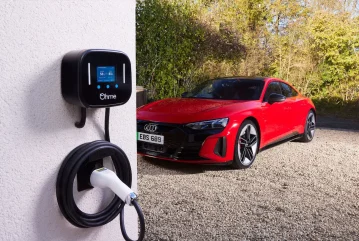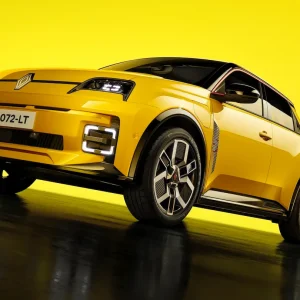
McDonald is quick to acknowledge that the pace of the market is in two very different states.
He says: “The fleet market is doing incredibly well with EVs – to the point that 80%+ of the new EVs that are bought are in the fleet channel. That is because you’ve got organisations like Motability that are being very proactive and progressively pushing an EV agenda and wanting more people to drive those products where it’s appropriate.
“Then you’ve got Benefit in Kind (BiK), which is a big take on company car fleets, and salary sacrifice programmes. With less penetration in the retail market, which hasn’t been as strong because there isn’t the same level of financial incentive.
“We work with fleets, we work with leasing companies, because they are the ones that are predominantly purchasing EVs. That will change over time, because these used EVs will need to be remarketed, and everyone is going to be motivated to want to get the best residual value they possibly can for them – that’s in everyone’s best interest to activate a used EV market. To maintain momentum, we need used EVs to sell, and become more reliant on the retail environment.
“We see fleets as the main adopters of electric vehicles in the first instance, and we are the partner of many, many leasing companies across the UK – and proudly work with them.
“We’re proud to be the partner with many leasecos, and we see that we’re helping them to build a good relationship with the end user – we’re helping the leasing company convert people to EVs.
“The role we’re playing is partly hardware, at the end of the day a piece of hardware gets installed at a customer’s house, that’s the proof – but there’s a lot that happens before that. We see that we can play a helpful role to the leasing companies, as that leasing company will need training. They’ll probably want to know more about home charging and where it’s helpful, how it incorporates with home energy and the costs associated with it. We provide that sort of training; we give them a platform that enables them to share leads with us.
“Leasing companies all have different journeys to here; they’ve got customers where we might be invoicing the driver for the charger, but others where the lease company is subsidising it, or even giving a complimentary charger. We’ve got a whole variety of journeys, and this used to be a world where you could give a customer a URL and ask them to complete it, but that doesn’t work in today’s world.
“Early adopters would investigate, explore, and research which home charger is right for them. Now more people recognise they need one, and they just want the one that’s the best and easiest to get. With that information, with our partners, we proactively contact the driver. We email them, we text them, we call them if necessary – to help them with their installation and make that process really easy.
“We qualify them very quickly – can they have a home charger, or not? Then provide them a survey that helps us get all the information necessary for installation – with very limited touch digitally. That is the service we believe the leasing companies need. They don’t really know how much demand they’re going to get – because they don’t know how many EVs they’re going to lease in the next month and how many people need a home charger.
“So, we effectively step in as the service provider. We will manage that customer, and very early on consult, qualify, install, and then since it’s our hardware being installed, have a continuation of that relationship – if there’s anything wrong, and the aftersales situation, the customer knows to contact Ohme, as we’ve helped them through that process. That’s what we believe leasing companies need, that’s how we support many of them, and we will continue to do that and expand the leasing companies that we work with.”
McDonald believes that the benefits of choosing Ohme for charging solutions for fleets fall into two camps.
He explains: “We’ve got hardware that’s really good value and can access all the cheap tariffs and you don’t have to change energy provider – we will optimise the charging, whatever tariff you’re on. Then if you want to swap to the Ovo or Octopus tariff, you need a charger that’s compliant with those, and we’re the only one. So, from that regard there’s demand for our hardware, our hardware is in the value end of the market from a pricing perspective – you’re not paying a premium.
“Hardware is only part of the story because you still need to manage the installation of it. Therefore, you need to quote on the cost, and if you’re a leasing company, you want a nationwide service, you want someone who can fit a charger anywhere in the country, and standardise the price for it, and standardise the SLAs around it.
“If you’re a leasing company in this space, the big challenge is how you provide that consistent, high-quality service to your drivers. Most leasing companies have selected a partner, and that partner manages installation and hardware – we’re one of the few that can do both of those things.
“We’re the partner for the NHS, Tusker, Knowles Fleet, but we also work with Athlon, Total Motion, JCT600, Octopus EV, Novuna, Zen Auto, SG Fleet, Marshalls and as I previously mentioned Motability. So, we work with the majority.
“Where you find complexity… is in the financial transaction, a lot of these fleets are big companies, and they’re used to procuring things directly. What we find is, often the end user relies on the leasing company.
“This is where our portals become helpful, because when you’re working with lease companies supplying hundreds of EVs, they need to keep track of it all. Our portal allows them to share a lead with us, then tell the nature of the lead, and whether we’re invoicing the driver, or the fleet, then manage the associated customer journeys. That was the biggest pain point we found with leasing companies – how to manage this at scale. If you’re doing one it’s no problem, but if you’re doing ten of those a week, this is how you manage that complexity.”





